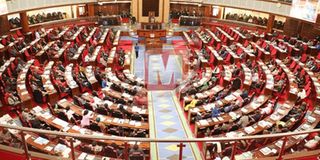Prime
Top leaders’ spouses to get hefty pay in proposed law changes

What you need to know:
- The amendments of the Political Service Retirement Act target spouses of top leaders, including the President, the Vice President, and the Prime Minister.
Dar es Salaam. The government yesterday tabled two bills seeking to change 33 laws, including one that would enable spouses of retiring top government leaders to be paid gratuity.
The amendment of the Political Service Retirement Benefits Act targets spouses of top leaders including the President, the Vice President and the Prime Minister.
With the proposed changes, a spouse of a leader who held the Office of the President, Vice President or the Prime Minister would be granted a gratuity equals to 25 percent of what their retiring partners received when in office.
The benefits of a president who has died are also subject to amendment, whereas the survivor will receive a pensions equals to 60 percent of the salary of the incumbent president. The bill also proposes repealing section 13 of the Act to read as follow: “Where the Vice-President dies in office or where he dies after ceasing to hold office but before benefits are granted to him, the appropriate authority shall grant to his dependants a gratuity which shall be equal to the total sum received by him as salaries when he was in office.”
Section 14 of the proposed amendments touches on the office of the Prime Minister. It says “where a leader who held the Office of the Prime Minister ceases to hold office, his spouse shall be granted a gratuity of the sum equal to 25 percent of the total sum received by him as salaries when he was in office.”
The proposed amendments comes 16 months after Mchinga Special Seat MP Salma Kikwete raised concerns about benefits of spouses of leaders holding the government’s top offices.
Ms Kikwete who is the wife of the former President Jakaya Kikwete was debating the budget of the Ministry of State in the President’s Office Public Service Management and Good Governance.
She said the spouses of the President, Vice President and Prime Minister are forced to abandon their duties shortly after their partners have been picked for the country’s top offices.
“Some have opted to start Non-Governmental Organizations (NGOs). But, they just end up struggling by themselves after receiving little or no support at all,” she told parliament.
Ms Kikwete said she didn’t expect to benefit with the changes, rather she was speaking for the benefit of the future leaders and spouses.
The law in Namibia recognises the benefits of spouses, including the children of retired and dead presidents who are below 21 years.
The law provides that the spouse and children would receive 75 percent of the partner’s monthly benefits.
Furthermore, the law provides that the profits will automatically come to an end in case the spouse and children get married.
In Kenya, the president’s benefits recognises children under the age of 18, up to 24 years who are still pursuing studies.
The law in both countries have established that the benefits will not be paid to leaders who have been ousted on criminal basis or any other charges that are against the country laws.
In another development section 127 the Evidence Act, Cap. 6 is amended to enable the evidence of a child of a tender age to be admitted in court.
The admission is regardless of not fulfilling the test provided for in the Act or any other written law regarding admissibility of evidence of a child of tender age.
“The aim of the proposed amendment is to address challenges observed in the court’s interpretation of the provision whereby, the evidence of a child of tender age is not awarded any weight if the child fails to promise to tell the truth or not to tell a lie,” reads another part of the document.
Also, the Bill seeks to mend the Penal Code, Cap. 16, whereas section 131(2) is proposed to be amended by providing the age of a child to be below eighteen years.
“The purpose of this amendment is to align the age of a child with other laws governing children,” reads the document.
Furthermore, the Bill proposes to amend the Economic and Organised Crime Control Act, Cap. 200, whereby section 29 is amended in order to raise the threshold of pecuniary amount of property involved in an offence charged for which bail application can be entertained to be three hundred million shillings.
“The purpose of this amendment is to remove contradictions of pecuniary provisions governing bail matters in economic cases,” reads the document.



